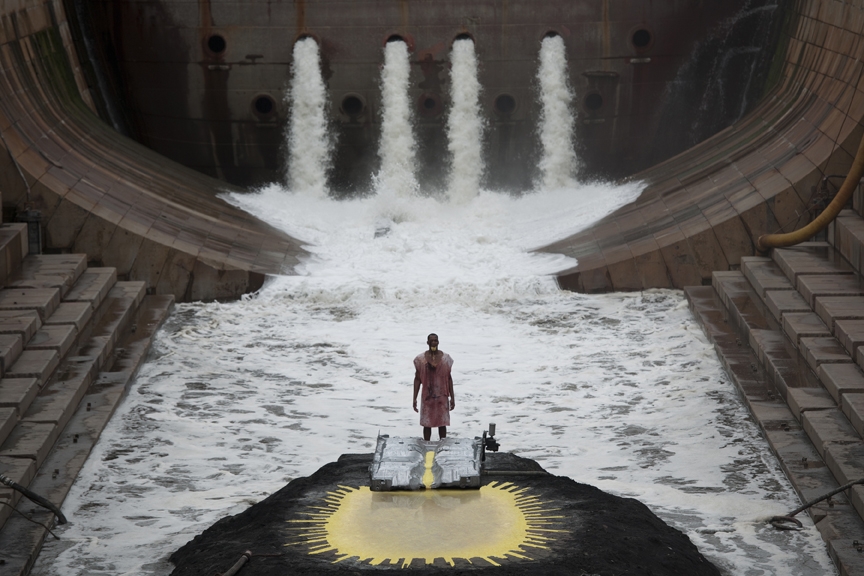Seconds in to River of Fundament (2014), the sprawling four and a half hour, operatic film adaptation of Norman Mailer’s scatological, Egyptian mythology epic Ancient Evenings, it’s clear Matthew Barney’s not pulling any punches. The ‘entered apprentice’ character from Cremaster 3 (2002), now reincarnated as Mailer’s daemon (no pun intended), emerges from a deep primordial soup of urine and faeces. Climbing stairs to an impressive replica of the author’s Manhattan home, he is sodomised by a cadaverous old man whose dripping semen turns to mercury and travels through Mailer’s apartment to the bloodied prosthetic limbs of actress Aimee Mullins. Of course, this all happens before the opening credits.
Intricately scored by composer Jonathan Bepler, and written and directed by Barney, River of Fundament covers the misadventures of Menenhetet, (here recast as Mailer) a subordinate of Queen Nefertiti and Rameses who undergoes several reincarnations in his quest for immortality. Action is either sung or naturalistically executed and shifts between a surreal wake for the deceased Mailer (featuring an assortment of Hollywood stars including Maggie Gyllenhaal, Paul Giamatti and Ellen Burstyn), and displays in which automobiles and industrial locations in Detroit support stylised clashes between Egyptian gods and aristocracy.
basic elements are embellished and made perplexingly dense by a succession of arcane references, product fetishism, complex symbology and character transformations
As with all of Barney’s cinematic work, these basic elements are embellished and made perplexingly dense by a succession of arcane references, product fetishism, complex symbology and character transformations. But, nobody watches a Barney film for lessons in narrative coherence. Indelible images and unforgettable sequences are his specialty, and when it works best River of Fundament is like nothing you’ve seen before. It is what happens between those moments that is the problem.
Technically speaking, Barney’s style of direction hasn’t really evolved, which means ponderous camera tracking, slow zooms, and aerial shots still predominate – epitomised in the final section of the film, where nature shots of an untamed American wilderness bring to mind the more inflated sections of Terrence Malick’s quasi-spiritual saga The Tree of Life (2011). In short doses this passes for intelligent, considered pacing; over more than four hours it is a mind-numbing ordeal. The effect is compounded by Barney’s penchant for gradual decay: bodies, buildings, vehicles and spectacular set pieces all slide along an entropic route to disorder. Consequently River of Fundament can seem like a collection of stitched together durational performance pieces, in which players spend the majority of their time on screen moving towards an event that rarely matches its intricate expository preparation.
This is why one of the most effective sections of the film is the sequence that leads up to opening titles. There you have a progression to a specific cataclysmic event, the film’s title sequence, magnificently reinforced by Bepler’s exceptional composition, a keening female chorus backed by chest shuddering drums that rocked the Coliseum’s gaudy interior.
Then there is Barney’s questionable use of human beings. The female body is unashamedly objectified and frequently reduced to the status of orifice or vessel. Pored over by Barney’s strangely pornographic directorial gaze, it is a disconcerting spectacle. Elsewhere his employ of ethnic minorities is superficial and simplistic. Mexicans, African and Native Americans are often clumsily instrumentalised and used for their exotic possibilities. Each seems to appear only to perform some race specific demonstration of vernacular culture. These are some of the most electrifying moments in the film, but they feel oddly extraneous. And why the fascination with Norman Mailer beyond the revision of his already convoluted narrative? Why is Barney so fixated on the myth of the ‘great American male artist’? Is this entire project a hubristic case for his inclusion into that elite, homosocial club?
From the first to the last, then, River of Fundament is a brilliantly scored, visionary, frustrating, exceptional and profoundly pretentious work. Full of shit, leaking holes, dripping buildings, oozing cracks and entropy it is perhaps best conceived of as an organic monumental sculpture, a piece of land art whose process of gradual disintegration is dramatised, scripted and recast as a dizzyingly intertextual narrative. The point isn’t to make sense of it; the point is to watch it decompose.
Web review first published 9 July 2014
